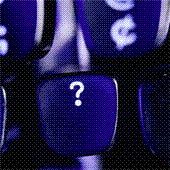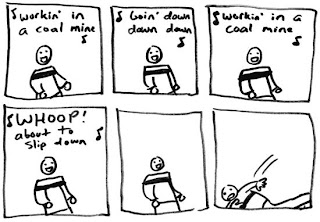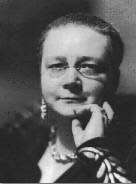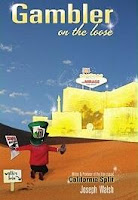Poker in the Mainstream: 60 Minutes Segment Set for Nov. 9
 I suspect most readers of this blog are aware of the latest regarding that impending 60 Minutes segment on the Absolute Poker/UltimateBet cheating scandals. Was at one time set to air last Sunday, then apparently was rescheduled for Sunday, November 9th -- the day the final table of this year’s World Series of Poker Main Event will finally recommence.
I suspect most readers of this blog are aware of the latest regarding that impending 60 Minutes segment on the Absolute Poker/UltimateBet cheating scandals. Was at one time set to air last Sunday, then apparently was rescheduled for Sunday, November 9th -- the day the final table of this year’s World Series of Poker Main Event will finally recommence. Interesting timing, eh? When they are playing the final table (which begins at 10 a.m. Vegas time on Sunday the 9th), do you think they’ll stop and watch the stopwatch? Hehe, probably not. Of course, I’ll be following the FT coverage on PokerNews that day (no way am I waiting to see it on ESPN), and yeah, I probably will take a break when 60 Minutes comes on that night.
Sounds as though there will be a substantial write-up in the Washington Post appearing on that day that will also cover the scandals. Serge “Adanthar” Ravitch, one of those who along with Nat Arem and others was involved in much of the detective work uncovering the scandals, will be participating in an online Q&A session for the Washington Post on that day, too.
All of which means when the segment finally does air on CBS that Sunday night, there will be a bit of follow-up nationally as other papers and outlets report on the report. Might be substantial, might not. In any case, those follow-up stories will no doubt also make reference to the fact that the WSOP ME winner is being determined on Monday the 10th, and ESPN will air its hastily-produced final table show on Tuesday the 11th.
Some are suggesting the 60 Minutes story and its immediate aftermath may in a kind of odd twist gain the ESPN final table show even more viewers. As Pokerati Dan suggested this week, the 60 Minutes show “will be great promotion to non-poker people of ESPN’s final table broadcast.” I don’t know if the indirect promotion of the ME final table will be “great” or not, but Dan is right to say that the show will draw the attention of many non-poker people to what is going on at the Rio and on ESPN around that time.
Dan also refers us to an interesting article by Wendeen H. Eolis over on the Poker Player Newspaper website regarding the upcoming 60 Minutes piece. Kind of difficult to get to the full article just clicking around the Poker Player Newspaper website, but if you click here you can see it in full.
Eolis discloses early on that she has a business relationship with CBS, and thus has some contacts within the network who “have provided various off the record information and comments” that helped her write her article.
She then describes the presence of the 60 Minutes crew and Steve Kroft (the lead reporter for the segment) at the WSOP last summer. Eolis perhaps exaggerates (a little) the anxiety felt at the Rio as 60 Minutes sought out possible interviewees. (I remember when they were there, and I also remember it was mostly business as usual.) Nevertheless, at least one Harrah’s executive told her “It was not a comfortable situation” during those couple of days when they were there.
She goes on to discuss an earlier example of 60 Minutes investigating cheating in poker, with the focus having been live games in California and Washington state. A team had been sent to investigate, and many hours were devoted to compiling information for a story, but “higher-ups slowed down the process” and ultimately the segment was nixed. Such an example proves Eolis’ point that the entire sequence of coming up with a segment idea, investigating it, producing it, and (ultimately) convincing the “higher-ups” to go with is “a laborious process in which vetting the extensive information obtained in an investigation is one part of it and analyzing potential interest by the mainstream public is an important second part.”
I find that last observation quite intriguing, insofar as the decision this time around to go forward with a segment about the online poker scandals clearly represents a different status for poker and its relationship to “the mainstream public.” Today there are quite a few famous poker players with whom even non-poker fans/players are familiar thanks to advertisements (mostly for online poker sites). Eolis notes how many such “poker celebrities” were interviewed for the segment.
She concludes by characterizing the scene at this summer’s WSOP as a kind of poker game, with the poker players and others trying to “play” 60 Minutes in such a way as to benefit poker in general and/or the online sites they represent. Writes Eolis, “It is not yet known whether Kroft’s on-camera interviewees outplayed their host so as to turn potential bad press into a golden opportunity for advocacy of congressional legislation that will allow online gaming in an appropriately taxed and regulated environment.”
As I say, an interesting take. I still think the segment represents an overall good -- insofar as it succeeds in exposing the utter unfairness of the cheating scandals (and their handling) at both AP and UB, giving those scandals coverage that goes well beyond what relatively little attention they’ve gotten thus far. The bottom line is, people -- especially those thinking about opening their first online poker accounts -- need to know there is a huge difference between AP and UB and other, better-managed, more respectable (and safe) sites.
I’m less sure about further effects of the 60 Minutes segment, such as its possible impact on future legislation or even its gathering that many extra viewers for ESPN’s final table show. Those effects are certainly worth looking out for, though.
Labels: *the rumble, 60 Minutes, Absolute Poker, cheating, UltimateBet




 from the button. Both blinds stuck around. The flop came
from the button. Both blinds stuck around. The flop came 

 and when it checked around to me I bet 95 cents to try to claim the orphaned pot. The blinds folded, and GLTirebiter called. The turn was the
and when it checked around to me I bet 95 cents to try to claim the orphaned pot. The blinds folded, and GLTirebiter called. The turn was the  and when GLTirebiter checked I decided just to check as well, although given my multiple draws, I really should be betting again there.
and when GLTirebiter checked I decided just to check as well, although given my multiple draws, I really should be betting again there.  , and when GLTirebiter checked I decided he didn’t have much and so bet $2.20 -- just over three-fourths of the pot. He called and showed
, and when GLTirebiter checked I decided he didn’t have much and so bet $2.20 -- just over three-fourths of the pot. He called and showed 


 . Like me, all he had was a pair of kings, but he had the ace for the better kicker.
. Like me, all he had was a pair of kings, but he had the ace for the better kicker. 



 , completing a possible flush. GLTirebiter checked, and I waited a bit before checking as well. Wasn’t really sure what I’d do on the river. Probably fold, unless I improved, as I was reasonably sure my neighbor had a flush.
, completing a possible flush. GLTirebiter checked, and I waited a bit before checking as well. Wasn’t really sure what I’d do on the river. Probably fold, unless I improved, as I was reasonably sure my neighbor had a flush.  , pairing the board and giving me top full house. GLTirebiter surprisingly bet $8.75. I lingered for a long time, then pushed all in for $25.65. He thought about it for a few seconds, then called, leaving himself just a buck behind). He showed
, pairing the board and giving me top full house. GLTirebiter surprisingly bet $8.75. I lingered for a long time, then pushed all in for $25.65. He thought about it for a few seconds, then called, leaving himself just a buck behind). He showed 

 for the nut flush. I’d won a $60.20 pot.
for the nut flush. I’d won a $60.20 pot.









 in the big blind. One player limped, the small blind completed, and I checked my option. We all checked the
in the big blind. One player limped, the small blind completed, and I checked my option. We all checked the 
 , pairing the board. The SB checked, and I waited a moment before betting $1.25 (a little over half the pot). The SB thought for several seconds, then called me with
, pairing the board. The SB checked, and I waited a moment before betting $1.25 (a little over half the pot). The SB thought for several seconds, then called me with 





 , giving me a very nice wrap draw -- a great flop with which to get aggressive, especially from late position. The big blind made a meek minimum bet of a quarter, and I raised to $1.00. The SB folded and the BB called.
, giving me a very nice wrap draw -- a great flop with which to get aggressive, especially from late position. The big blind made a meek minimum bet of a quarter, and I raised to $1.00. The SB folded and the BB called. , giving me my straight (and also making flushies impossible). The BB checked, I bet $2.50 (nearly the size of the pot), and he very quickly called. The river was the
, giving me my straight (and also making flushies impossible). The BB checked, I bet $2.50 (nearly the size of the pot), and he very quickly called. The river was the  , changing nothing. He checked again, and this time I value bet $3. He again called right away, turning over
, changing nothing. He checked again, and this time I value bet $3. He again called right away, turning over 

 -- just a pair of aces. I’d dragged the $13.10 pot.
-- just a pair of aces. I’d dragged the $13.10 pot.












